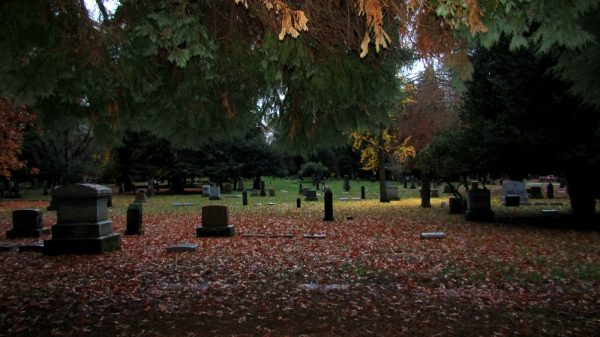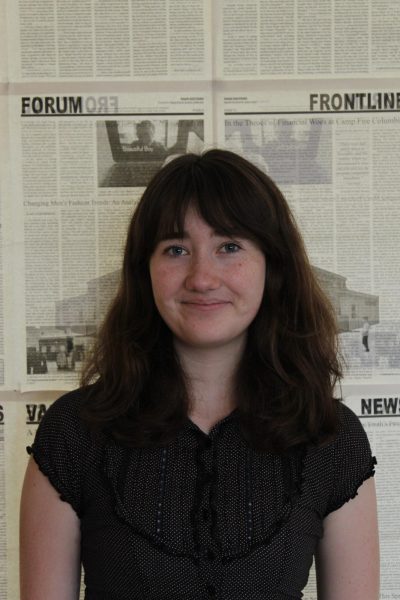
Keith Rowell is waiting for one thing: the United States government to divulge its “greatest secret.” This secret, says Rowell, former assistant state director for Oregon Mutual UFO Network, is the “proof that we are not alone and never have been.”
Throughout humankind’s existence, it has become clear that some things slip through the cracks in our understanding. These things — whether extraterrestrial, paranormal, or cryptid ― fascinate us. Possibly unbeknownst to Rowell, he is joined by many, including bigfoot researchers and paranormal investigators, in the quest for irrefutable proof to satisfy their curiosity about the unknown.
“I think I’ve got some satisfying answers today, but it’s complicated,” says Rowell. His 40+ years of inquiry and interest in the extraterrestrial started for him in the mid-70s when Rowell was employed in the Portland Public School library book processing department. One day, some books about UFOs (Unidentified Flying Objects) came through and caught his eye. “I was curious and picked out a couple to read,” he says. This initial curiosity grew into something much more. “My beliefs about what human experience is and what the world is have changed drastically since that fateful month I spent reading those first two books about UFOs,” says Rowell.
Explanations for the unexplainable are a specialty of humans. Myths and legends exist all around the world, narrating the history of our curiosities and thoughts. Given the vastness of our universe and our enduring beliefs in the paranormal, is it so hard to believe that something else is out there?
“I understand what it takes to believe … You have to really want it,” says Dr. Robert David, an anthropology professor at Portland State University. He “went down the road of aliens and bigfoot” when he was younger and began questioning his belief in Christianity. “It was fun to believe. It was a reaction against what I believed up to that point.” For David, these beliefs went away throughout his higher education experience and as his interest in archaeology grew. Developing a greater scientific understanding disproved his earlier beliefs in the paranormal. “It actually turned me around,” David explains.
Though science can indeed fill in gaps in our understanding and eliminate speculation, it does not dispel all curiosity about fringe subjects. For many interested in the paranormal, science does not negate their beliefs; in fact, it’s exactly what they are pursuing.
“The truth can always withstand any amount of scrutiny,” says Cliff Barackman, curator of the North American Bigfoot Center in Boring, OR. Though Barackman once considered proving their existence the most important thing, he has now shifted his efforts towards learning about Sasquatches and educating the public through the Bigfoot Center. “I reason that since [Sasquatches] are real animals, a dead one will come in at some point,” says Barackman, expressing the security of his personal belief in Sasquatches. He worries that a lack of knowledge about the species will eventually cause them much harm. “Pretty much all human atrocities come from a place of ignorance,” he explains.
Rowell states that obtaining physical evidence, such as saucer debris, will substantiate the current work of UFO scholars and scientists and further the area of study. Much of his expertise comes from years of first-hand experience as a field investigator. “Academia [largely] rejects paranormal phenomena as worthy of study,” he says. Though UFOs are perhaps secretive in nature, Rowell asserts that scholarly research practices can be applied to them as well as any other subject.
“I absolutely believe ghosts exist. I’ve seen enough unexplainable things to believe,” says Scott Riedel, co-founder of Oregon Paranormal, a paranormal investigating agency. “That doesn’t mean everywhere we go, there’s something paranormal happening. Sometimes what’s happening is very easily explained and just unusual, but [it’s] not paranormal.”
The investigation agency conducts two to three full investigations a year while providing advice and direction to many more people. These investigations are multi-month processes that include in-depth research and hours upon hours of data collection. “We go into every investigation with a high level of skepticism,” says Riedel. “That is to say, we look at things as scientifically as we can.” He explains that there are often natural and non-paranormal explanations for things. He says that though an investigation might not find a paranormal event, it’s important to always validate the experiences of the individual who called the investigation. “We believe what people tell us … We’re trying to help [them] feel safe,” he says.
Context is always important when considering “unexplainable” events, which might have normal explanations given consideration of the situation at large. David states that when social and historical context is ignored, things can be misconstrued. He references the pyramids of Egypt, which people have speculated were the work of aliens. This belief, he says, ignores the existing archeological evidence of people building the pyramids.
“Portland has a very traumatic and racist and violent history,” says Riedel, “[which] could create more paranormal events.” Even with origins in upsetting events, and though paranormal occurrences are commonly accepted to be frightening, Riedel argues that fear is not a response based on fact. “The biggest thing to be afraid of [about ghosts] is turning around a corner and [being startled by] someone that you’re not expecting,” he says. “[Ghosts] are just trying to be known and understood. They’re trying to get your attention in some way.” Riedel compares ghosts to a roommate you didn’t pick. He clarifies that, while no longer human, ghosts used to be people, good and bad.
Similarly, Barackman does not believe Sasquatches are an active threat to humans. He maintains that they are like any large wild animal, and should be given the same respect given to grizzly bears or moose. “If they were out to get us, there would be very few of us left,” he says, expressing that the creatures are not overtly dangerous.
Rowell says that UFOs don’t pose a significant threat to the public now, but their future remains uncertain. “If we get the truth from the Pentagon, it’ll be a whole new ballgame,” claims Rowell. “[Then], the public should be concerned because of the implications of non-human intelligence engagement with humankind.” As our technology advances, who knows what may be revealed? UFOs are an increasingly relevant topic in the government. On Nov. 13, congress held a hearing discussing UFOs and government involvement. “Saucers are finally really serious business,” says Rowell.
For the most part, Barackman, Riedel, and Rowell seem to agree that it’s not their job to manage people’s beliefs. “Arguing with debunkers — people who just know in their hearts and minds they are always right — is counterproductive,” explains Rowell. People may have set beliefs. Riedel explains that believing in only what can be seen and touched makes people shy away from believing in the paranormal.
Respecting beliefs goes both ways. Others’ beliefs and curiosities can be separate from your own. As long as they don’t cause harm, they have just as much a right to existence as any other belief. “It’s none of my business what other people think about what I’m doing,” says Barackman.
Many first encounter the paranormal on television or in books. While these sources can certainly spark interest leading to actual research, they can also perpetuate concepts that are not accepted within paranormal communities. These concepts are for entertainment’s sake. “I encounter skepticism a fair amount, and I encourage it,” states Barackman. “People absolutely should be skeptical about any claim from [television and the internet]. I tell people to look closely at the claims, ask questions about them, and do some digging.”
In the face of rampant misinformation spread on the internet, Rowell explains,“We somewhat jokingly tell our audience to stop surfing the Internet if you want the truth about flying saucers. Start reading the serious UFO literature!”
Media often sensationalizes, especially in the case of ghosts. Riedel feels movies and television drive fear and misunderstanding by representing ghosts as “scary and evil.” He points out that “ghost hunting” reality shows are faked and meant to manufacture negative perceptions about ghosts.
Paranormal curiosities are invalidated because of media like this. “People see what they want to see,” says David, “and they fill in [the gaps] with mysterious and scary [things].” If genuine inquiry that uses science is passed up for shock value, it can create dangerous misconceptions. David stresses the importance of empirical evidence, citing most other things as unreliable. It’s dangerous to ignore science and discard the need for evidence. Beliefs that don’t listen to science render themselves unchallengeable, therefore putting a stop to learning, explains David.
Large and strong communities have formed around the belief in Sasquatches, UFOs, and ghosts. “It’s a very large, accepting, and, for the most part, professional community,” says Riedel of Oregon’s paranormal community. He says that Oregon Paranormal has found collaborators in this community. “There is a wide variety of beliefs that often directly contradict those of others in the [Sasquatch] community,” says Barackman. He says the tactics and disposition of this community don’t always resonate with him, but the community still exists.
Portland is home to many rumored hauntings, including the Shanghai Tunnels, Lone Fir Cemetery, and the North Portland Library. These rumored hauntings are just one piece in the puzzle of Oregon’s anomalies. Interest in the paranormal brings people together across the state. Events like the Oregon Ghost Conference, McMenamins’ UFO Fest, and the Oregon Bigfoot Festival are the culmination of the love of these subjects.
Curiosity is relentless. Humans have a strong inclination to believe, and an even stronger compulsion to understand. We will always have questions about the unknown, even if our current ones are answered; it’s human nature to look further.


































